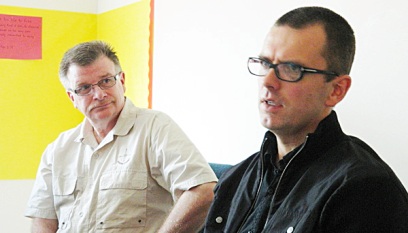By Ken Camp
The United States doesn’t have a monopoly on people who claim to be spiritual but not religious, a group of Baptist ministers in North Texas learned from a Latvian Baptist leader.
Baptists in Latvia hope to respond to their nation’s spiritual hunger and disaffection with organized religion by planting unconventional churches and nurturing a new generation of leaders, said Peteris Sprogis, bishop of the Latvian Baptist Union. And they seek global partners to undergird those initiatives.
 Sprogis, founder of the Baltic Pastoral Institute for Church Planting, told a group of Texas Baptist church planters and missions leaders about the challenge his country faces as it continues to recover from 50 years of Soviet domination.
Sprogis, founder of the Baltic Pastoral Institute for Church Planting, told a group of Texas Baptist church planters and missions leaders about the challenge his country faces as it continues to recover from 50 years of Soviet domination.
“The older generation was affected by Soviet thinking. The younger generation is affected by western materialism and secularism. There is an increasing interest in spirituality and a decreasing interest in church. People are looking for answers, but not in church,” he explained to pastors gathered at Grand View Baptist Church in Mesquite, Texas.
Only 3 percent of Latvia’s population regularly attend church or read the Bible, he reported. “The question we have to face is this: What are we willing to do to reach the 97 percent?”
One strategy focuses on church planting. In the last couple of years, Latvian Baptists — with 88 established churches and 66 pastors, one-third of whom are approaching retirement age — have planted 22 “missional communities,” particularly among students and young adults, Sprogis said. These church-planting teams concentrate on building relationships with non-Christians.
“By becoming friends, these missional communities are inviting (unchurched) people into their lives rather than inviting them into a building,” he explained. “People want personal connections. They want to talk to you, not just spend 45 minutes listening to you.”
As a parallel strategy, Latvian Baptists also are devoting attention to future leadership development by focusing on ministry to children and teenagers. The Baltic Pastoral Institute for Church Planting sponsors a “draft” — modeled after an athletic training camp — to enlist and recruit young teenage boys who show potential as leaders. The training camp includes both physical and spiritual challenges designed to motivate and inspire Christian young men, Sprogis said.
Evangelicals from Estonia and Switzerland have attended the BPI draft camp and started similar programs in their countries, he added. Sprogis hopes Baptists in the United States will consider entering into partnerships with church planters and congregations in Latvia, providing mentors, church-planting expertise, prayer support and financial assistance.
“It’s an opportunity to come alongside something that stands to change a continent, not just a nation,” said Milfred Minatrea, pastor of Grand View Baptist Church in Mesquite, Texas, who plans to participate in an exploratory trip to Latvia in late September or early October.
